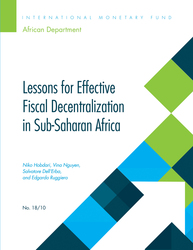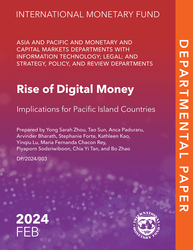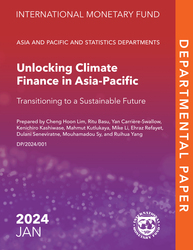
Lessons for Effective Fiscal Decentralization in Sub-Saharan Africa
Lessons for Effective Fiscal Decentralization in Sub-Saharan Africa
READ MORE...
Volume/Issue:
Volume 2018
Issue 009
Publication date: July 2018
ISBN: 9781484358269
$20.00
Add to Cart by clicking price of the language and format you'd like to purchase
Available Languages and Formats
| English |
Topics covered in this book
This title contains information about the following subjects.
Click on a subject if you would like to see other titles with the same subjects.
Economics- Macroeconomics , Public Finance , Economics / General , International - Economics , national government , IMF government finance statistics database , effectiveness indicator , authorities in South Africa , decentralization reform , Fiscal federalism , Income distribution , Sub-Saharan Africa , Africa
Also of interest
Summary
Fiscal decentralization is becoming a pressing issue in a number of countries in sub-Saharan Africa, reflecting demands for a greater local voice in spending decisions and efforts to strengthen social cohesion. Against this backdrop, this paper seeks to distill the lessons for an effective fiscal decentralization reform, focusing on the macroeconomic aspects. The main findings for sub-Saharan African countries that have decentralized, based on an empirical analysis and four case studies (Kenya, Nigeria, South Africa, Uganda), are as follows: • Determinants and effectiveness: Empirical results suggest that (1) the major driving forces behind fiscal decentralization in sub-Saharan Africa include efforts to defuse ethnic conflicts, the initial level of income, and the urban-ization rate, whereas strength of democracy is not an important determi-nant for decentralization; and (2) decentralization in sub-Saharan Africa is associated with higher growth in the presence of stronger institutions. • Spending assignments: The allocation of spending across levels of gov-ernment in the four case studies is broadly consistent with best practice. However, in Uganda, unlike in the other three case studies, subnational governments have little flexibility to make spending decisions as a result of a deconcentrated rather than a devolved system of government. • Own revenue: The assignment of taxing powers is broadly in line with best practice in the four case studies, with the bulk of subnational revenue coming from property taxes and from fees for local services. However, own revenues are a very small fraction of subnational spending, reflecting weak cadaster systems and a high level of informality in the economy.
Copyright © 2010 - 2024
Powered by:
AIDC



